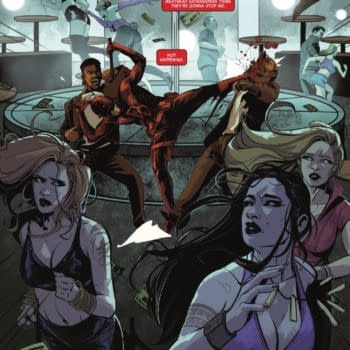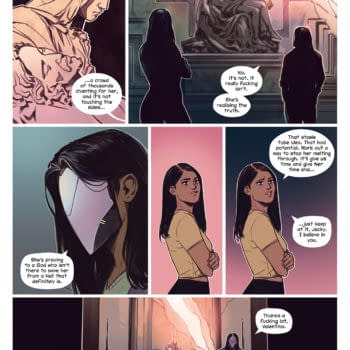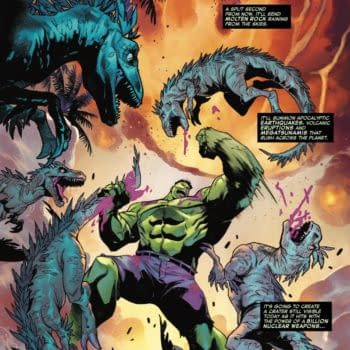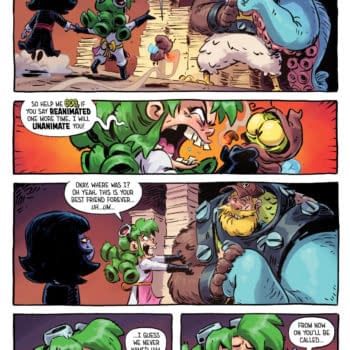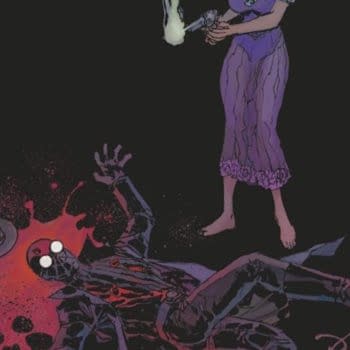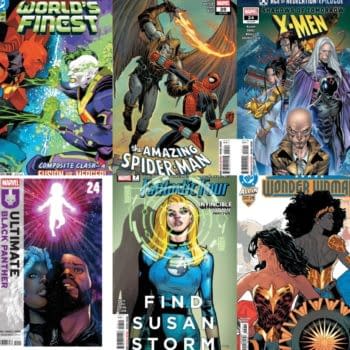Posted in: Books, Comics | Tagged: handbook for mortals, lani sarem, marvel, Matthew Rosenberg
Taking Cue From Comics, Young Adult Book Publisher Allegedly Rigs Sales Charts For 'Handbook For Mortals'
Artificially inflated sales statistics aren't just for Marvel Comics anymore!
There's a story making its way around the internet about a new Young Adult novel called Handbook for Mortals by newcomer author Lani Sarem, which has just topped the New York Times bestseller list. But the book's success might not be what it seems.
Website Pajiba has a detailed breakdown on the story, mostly via tweets from YA author and publisher Phil Stamper. Here's the basic idea:
According to Stamper, ordering a bulk number of books just underneath the number that would flag the orders as "corporate" would keep those orders eligible for counting toward the Bestseller List. To make the stakes even greater, the book already has an IMDB page, as publisher Geek Nation is apparently looking to develop it into a film franchise. There's a ton more details at Pajiba's report, which they keep updating, so go and read them there. The last update shows that the New York Times is apparently looking into the matter:
The story has caused a lot of ruckus on Twitter, with readers outraged that the book could buy its way onto the charts. But is this really an unusual phenomenon? The whole thing is very reminiscent of how the movie Cowboys and Aliens got made, detailed in a Bleeding Cool article from 2010 and drawing on Bleeding Cool Rumormonger-in-Chief Rich Johnston's pre-Bleeding-Cool investigation.
But gaming sales charts goes way beyond these high profile instances.
Marvel Comics writer Matthew Rosenberg addressed this on Twitter:
And those are good points. Though a handsome and intelligent tweeter user also pointed out:
Rosenberg disagreed:
And he's not necessarily wrong about that either.
Though, we'd argue that while the stakes may be higher in book publishing than in comics, the comic book industry is remarkable for relying almost entirely on shenanigans to fuel their sales. There's the incentive variant system that some direct market retailers are pushing back against Marvel for. In that scam, Marvel offers special variant covers, but only if stores order 100% to 200% more copies of the regular cover to be eligible to purchase them. Shops can sell the variant covers for inflated prices, potentially recouping the loss of buying the extra comics, but nobody is actually reading those comics, because if the store could sell that many, they would have ordered that many in the first place. It just serves to make it look like Marvel sold 2-3 the number of comics that people are actually reading (with the added benefit of pushing the financial burden of Marvel's inability to make readers want their comics onto comic shops).
This happens, not occasionally, but all the freaking time. And that's not the only underhanded tactic at play. There's the free overshipping of comics, where Marvel simply shipped more copies of comics to stores than they ordered during a particularly slow couple of months, causing a unit sales bump on the Diamond sales chart. There's the constant rebooting or relaunching of series because stores instinctively order more copies of a book if it has a #1 on the cover, even though the sales soon drop right back down to the same level they were at before the reboot. The same concept can be applied to super-mega-crossover events tie-ins.
The comics industrial complex and the Diamond monopoly system aren't being gamed in this case. The system is designed that way. Comics are purchased by stores, ordered weeks in advance, and they're not returnable, leaving the bookseller stuck with the product even if no one wants to buy it. And the sales charts, unlike the New York Times Bestseller List, aren't even based on readers buying comics. They're based on the number of copies retailers order. Comic Book publishers don't need to care whether people read their comics. They only need retailers to buy them and barely stay in business so they can keep buying them, and they can tout increased sales to their corporate overlords at Disney who aren't paying enough attention to realize it would be easier to just farm the comic book properties out to another company like IDW and continue focusing on the movies, TV shows, video games, and merchandise, where the real money is made.
All our opinion, of course. Your mileage may vary.
But Rosenberg disagrees with all of that (or at least the summary we gave him on Twitter).
We do work at Bleeding Cool, after all.
Maybe so, though we'll point out that both movie and music charts are based on products sold to customers, not retailers. But we'll just have to agree to disagree on which industry is the worst (it's actually the clickbait entertainment journalism industry, if we're being totally honest).
In the grand scheme of things, Rosenberg is correct: these systems are gamed all the time by big companies, and if a few independent creators have figured out how to game it with less resources, who are we to cast aspersions?






